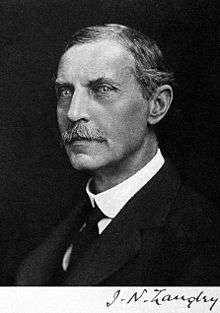John Newport Langley
| John Newport Langley | |
|---|---|
 | |
| Born |
2 November 1852 Newbury, UK |
| Died |
5 November 1925 (aged 73) Cambridge, UK |
| Residence | UK |
| Nationality | British |
| Fields | Physiologist |
| Institutions | University of Cambridge |
| Alma mater | University of Cambridge |
| Academic advisors | Michael Foster |
| Notable students |
Walter Morley Fletcher Charles Sherrington |
| Known for |
Autonomic nervous system Secretion |
| Notable awards | Royal Medal (1892) |
| Notes | |
John Newport Langley (2 November 1852 – 5 November 1925) was a British physiologist. He spent his entire career at Cambridge University. He was elected a Fellow of the Royal Society in 1883 and later its vice-president.
Langley is known as one of the fathers of the chemical receptor theory, and as the origin of the concept of "receptive substance".[1][2]
In 1901, he advanced research in neurotransmitters and chemical receptors, working with extracts from adrenal glands. These extracts elicited responses in tissues that were similar to those induced by nerve stimulation.[3]
References
- ↑ Langley J.N. (1905). "On the reaction of cells and of nerve-endings to certain poisons, chiefly as regards the reaction of striated muscle to nicotine and to curari". J Physiol. 33 (4-5): 374–413. doi:10.1113/jphysiol.1905.sp001128. PMC 1465797
 . PMID 16992819.
. PMID 16992819. - ↑ Maehle A.-H. (2004). ""Receptive Substances": John Newport Langley (1852–1925) and his Path to a Receptor Theory of Drug Action". Med Hist. 48 (2): 153–174. doi:10.1017/s0025727300000090. PMC 546337
 . PMID 15151102.
. PMID 15151102. - ↑ Rubin, Ronald P. (December 2007). "A Brief History of Great Discoveries in Pharmacology: In Celebration of the Centennial Anniversary of the Founding of the American Society of Pharmacology and Experimental Therapeutics". Pharmacological Reviews. 59 (4): 289–359. doi:10.1124/pr.107.70102. PMID 18160700.
Bibliography
| Wikimedia Commons has media related to John Newport Langley. |
| Wikisource has original works written by or about: John Newport Langley |
- Katz, B. (1986). "Archibald Vivian Hill", Dictionary of National Biography, Oxford University Press, Oxford, p. 406
This article is issued from Wikipedia - version of the 3/17/2016. The text is available under the Creative Commons Attribution/Share Alike but additional terms may apply for the media files.